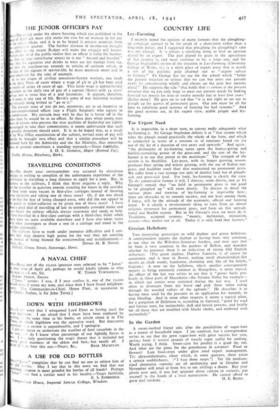Tne Urgent Need It is impossible, in a short note,
to convey really adequately what ley-farming is. Sir George Stapledon defines it as " that system which takes the plough round practically the whole of the farm, and which is conducted in terms of a rotation or of rotations based on the use of the ley of a duration of two years and upwards." And again: "the philosophy of ley-farming turns upon the humus-giving and fertility-sustaining power of the grass-sod, and the aim of the ley- farmer is to use that power to the maximum." The strength of the system is its flexibility. Ley-grass, with its longer growing season, produces finer spring and winter grazing, with the use of Italian rye- grass, and healthier stock than that maintained on permanent grass. We suffer from a vast acreage not only of derelict land but of plough- sick and grass-sick land. For both, ley-farming is clearly the cure. To th: conservative farmer it will, I daresay, seem drastic, just ,#s Sir George's remark that "no field in permanent grass is too good to be ploughed up " will seem drastic. To discuss in detail the various plans and rotation of ley-farming is impossible here ; there are obstacles to its smooth success, and not least among them, I fancy, will be the attitude of the economic, official and farming mind. It is clearly a revolutionary thing to turn from an almost religious reverence for permanent grass, and farm on this untradi- tional and flexible system. But in Sir George's view we must do it. Traditions, accepted systems, " money, inclination, reputation, esteem—they matter not at all. Today it is only food that matters."


























 Previous page
Previous page